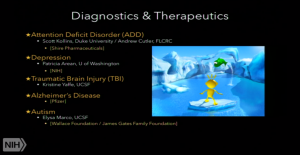OBSSR Hosts Seminar on Video Games and Neuroscience
Neuroscientist Adam Gazzaley, University of California, San Francisco, discussed his research and what he described as “the new frontiers” in video games and neuroscience. The November 5 presentation was part of the NIH Behavioral and Social Sciences Seminar Series, sponsored by the National Institutes of Health (NIH) Office of Behavioral and Social Sciences Research (OBSSR).
Gazzaley noted that humans have longed been consumed with achieving high-level performance, particularly when it comes to physical fitness. However, when it comes to the human brain and improving “those core functions that are really fundamental to what makes us humans—higher order cognitive ability, perception, memory, emotional regulation, decision making, compassion, wisdom,” Gazzaley maintained that we are not doing quite as well. He further emphasized that we are not taking advantage of all the amazing innovations in neuroimaging and cognitive neuroscience to understand in detail what is occurring in the brain.
He described his lab’s approach to addressing this issue, as one “that uses custom-designed video games to achieve meaningful and sustainable cognitive enhancement.” Gazzaley believes that technology can be used to “create powerful experiences” and that those experiences are the “gateway to plasticity, that complex dense of change that occurs in the brain.” The challenge, he argued, is to use modern technology to “build experiences that harness plasticity and direct it to better our lives.” To illustrate, Gazzaley pointed to the increased level of sophistication in the gaming industry, including the ability to feed real time information into the game, thus, allowing the circuitry of the brain to be changed.
 Gazzaley, who has been supported by the National Institute on Aging (NIA), cited as an example the impairments that older adults experience as part of healthy aging as an area where “playing games” can have an unexpected positive impact for the game player. He shared his first foray into games as therapeutic research seven years ago when he and a team of video game developers were able to create a driving game and had older volunteers play it. To their amazement, subjects showed improvement in areas of cognitive control that were not “directly trained by the game,” including significant improvement in working memory and an increase in sustained attention.
Gazzaley, who has been supported by the National Institute on Aging (NIA), cited as an example the impairments that older adults experience as part of healthy aging as an area where “playing games” can have an unexpected positive impact for the game player. He shared his first foray into games as therapeutic research seven years ago when he and a team of video game developers were able to create a driving game and had older volunteers play it. To their amazement, subjects showed improvement in areas of cognitive control that were not “directly trained by the game,” including significant improvement in working memory and an increase in sustained attention.
Gazzaley also discussed the next stage of his research program, which uses video games integrated with technological innovations in software and hardware to treat neurological and psychiatric conditions, as well as better target our educational efforts. There are a number of games that are now entering research studies, he explained. His lab is looking for changes across indicators including structural MRIs, EEGs, stress, blood work, inflammatory markers, sleep, and lifestyle measures to better understand how the games change us.
Gazzaley’s complete lecture is available on the NIH’s website. Recent NIH behavioral and social science lectures topics can be found here.

